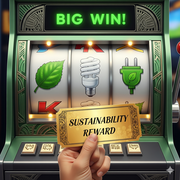Lottery Incentives for Energy-Saving Behavior: A Sustainable Policy Proposal
In Indonesia where gaming is legal, visiting sites that are included in the daftar situs 55five (55five site list) is creatively combined with the activities of saving energy. Think about how much more opportunities to win the lottery you would have by consuming less power at home. Not only is this concept making things more interesting, people are becoming more eco-friendly and mindful of their money.
How the Model of Incentive Works
To understand it better, read on:
1. Tracking your home’s energy use
Participants keep track of how much energy they use each day with an app. They get “energy points” for lowering usage, especially during busy times.
2. Rewards for entering the lottery
 Saving energy becomes a game that people look forward to when each energy point is turned into a ticket for a weekly or monthly draw.
Saving energy becomes a game that people look forward to when each energy point is turned into a ticket for a weekly or monthly draw.
3. Tiered Incentives for Greater Impact
- Bronze Tier: Small energy reductions bring little benefits.
- Silver and Gold Tiers: A longer-term, larger savings mean improved rewards, such as eco-friendly gadgets, returns, or small cash rewards.
What this Concept has to do with the Two Themes
Let’s try to break it down.
For the Gambling Sector
It is a new way of making people play, with fun lotteries, plus behavioral reward.
In the Case of Economics and Energy
Makes people use less, helps to maintain the grid, and makes people save money.
In a very interesting manner, the blog post How Sports Betting Shapes Consumer Behavior and Spending considers the impact of gaming on the spending behavior of people. This can be compared to the same way that sports betting influences the types of purchases people make.
Energy rewards tied to the lottery can modify the behavior of people to become more energy efficient.
Economic and Environmental Benefits
Check these advantages:
Load Management
By encouraging people to use less energy when the grid is not at peak, the load will not get too heavy at peak time.
Cost Efficiency
Reduced generation costs due to reduced demand may result in reduced customer prices.
Public Engagement
Turning conservation into a game increases awareness and unites people to seek to conserve more energy.
End Notes
Such a policy blend of lottery wins and energy conservation is creative and actual. Through behavioral rewards, both public and private stakeholders can help people form habits that will last and keep them interested in fun and important ways. Everyone benefits; players stay interested, demand for energy goes down, and we get closer to a greener, more efficient future.

